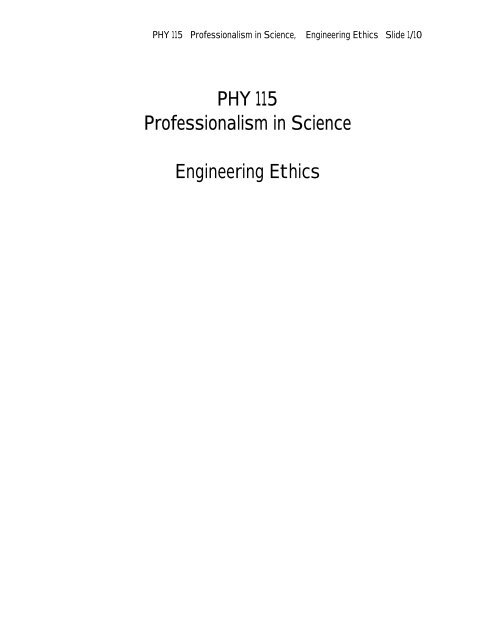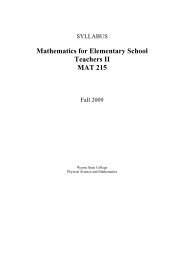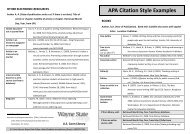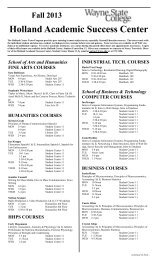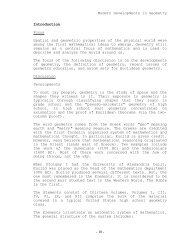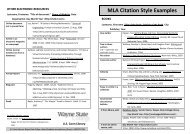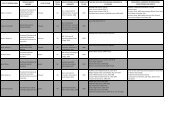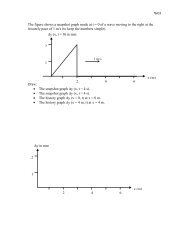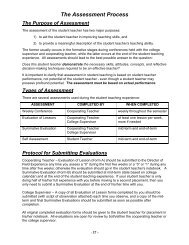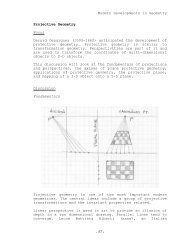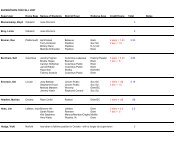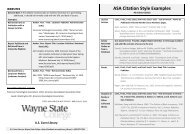Engineering Ethics Problem Solving Introduction to Design Numbers ...
Engineering Ethics Problem Solving Introduction to Design Numbers ...
Engineering Ethics Problem Solving Introduction to Design Numbers ...
You also want an ePaper? Increase the reach of your titles
YUMPU automatically turns print PDFs into web optimized ePapers that Google loves.
PHY 115 Professionalism in Science, <strong>Engineering</strong> <strong>Ethics</strong> Slide 1/10<br />
PHY 115<br />
Professionalism in Science<br />
<strong>Engineering</strong> <strong>Ethics</strong>
PHY 115 Professionalism in Science, <strong>Engineering</strong> <strong>Ethics</strong> Slide 2/10<br />
What is <strong>Engineering</strong> <strong>Ethics</strong>?<br />
<strong>Ethics</strong> is the study of the characteristics of morals.<br />
<strong>Engineering</strong> ethics refers <strong>to</strong> the rules and standards governing the<br />
conduct of engineers in their role as a professional.<br />
The attributes of a profession are:<br />
Is engineering a profession?<br />
o<br />
o<br />
o<br />
o<br />
The work requires sophisticated skills, use of judgment, and<br />
discretion. The work is not routine and cannot be mechanized.<br />
Membership in the profession requires extensive “formal”<br />
education.<br />
The public allows for the existence of special societies or<br />
organizations that are controlled by members. These societies<br />
and organizations have some authority <strong>to</strong> set standards for<br />
admission in<strong>to</strong> the profession, <strong>to</strong> set standards for conduct,<br />
and <strong>to</strong> enforce these standards.<br />
Significant public good results from the practice of the<br />
profession.<br />
(Martin and Schinzinger, 1989)<br />
Judgment as referred <strong>to</strong> in the definition above, means the making of<br />
significant decisions based on education and training.<br />
Discretion may mean keeping confidentiality when comes <strong>to</strong> working with<br />
clients. It can also mean that the engineer is held in high regard, that<br />
he/she can make his/her own decisions (“use your own discretion”).
PHY 115 Professionalism in Science, <strong>Engineering</strong> <strong>Ethics</strong> Slide 3/10<br />
Importance of Studying <strong>Ethics</strong><br />
The main need for studying engineering ethics is <strong>to</strong> sensitize one <strong>to</strong> the<br />
important issues that he/she may eventually confront.<br />
Origins of <strong>Ethics</strong><br />
Western ethical thoughts have been developed over the years in the<br />
Judeo-Christian tradition. Non-Western cultures have also developed<br />
similar ethics. Thus, it is not necessarily a societal or religious<br />
phenomenon.<br />
<strong>Ethics</strong> is also strongly related <strong>to</strong> law. One must follow international,<br />
federal, state, and local laws.<br />
Rules and regulations may also exist for professional societies and<br />
organizations. These societies and organizations may also have “Codes<br />
of <strong>Ethics</strong> and Conduct”.<br />
National Society of Professional Engineers (NPSE)<br />
Objections <strong>to</strong> Society Codes<br />
Relatively few practicing engineers belong <strong>to</strong> professional societies.<br />
Members of societies are not aware of their codes of conduct.<br />
Members aware of the codes seldom consult them.<br />
<strong>Engineering</strong> codes may have internal conflicts.<br />
Codes may be coercive; they force members <strong>to</strong> comply with a “big stick”<br />
rather than with a “carrot” (Fleddermann, 1999, p 22).
PHY 115 Professionalism in Science, <strong>Engineering</strong> <strong>Ethics</strong> Slide 4/10<br />
Resolving Internal Conflict<br />
An example of internal conflict in codes of ethics is where an employer<br />
orders an engineer <strong>to</strong> implement an unsafe design (Ford Pin<strong>to</strong>). The<br />
NSPE Codes of Conduct state in clause I.4, that an engineer has a duty<br />
<strong>to</strong> his/her employer. But, they also state in clause I.1 as well as the<br />
preamble, that public safety is also important.<br />
Most codes have a hierarchy in their clauses and standards. In the<br />
NSPE codes, public safety is paramount, thus superceding duty <strong>to</strong> an<br />
employer.<br />
Safety and Risk<br />
Safety and risk tend <strong>to</strong> play center stage in many cases involving ethics.<br />
One cannot discuss safety without including risk. An engineer must<br />
decide how much risk is appropriate? How safe is safe enough?<br />
Risk involves the possibility of suffering injury or harm. Safety can mean<br />
the absence of danger or risk.<br />
Safety in terms of a safe design must meet four criteria.<br />
1) A design must comply with applicable laws.<br />
2) A design must meet the standard of “acceptable engineering<br />
practice”.<br />
3) Alternative designs, that are potentially safer, must be<br />
explored.<br />
4) Engineers must attempt <strong>to</strong> foresee all potential misuses of a<br />
product and design <strong>to</strong> handle them.
PHY 115 Professionalism in Science, <strong>Engineering</strong> <strong>Ethics</strong> Slide 5/10<br />
Safety should be embedded in<strong>to</strong> the engineering design process. A sixstep<br />
process <strong>to</strong> engineering design is:<br />
1) Define the problem. This step includes determining the needs<br />
and requirements and often involves determining the<br />
constraints.<br />
2) Generate several solutions. Multiple alternative designs are<br />
created.<br />
3) Analyze each solution <strong>to</strong> determine the pros and cons of each.<br />
This step involves determining the consequences of each design<br />
solution and determining whether it solves the problem.<br />
4) Test the solutions.<br />
5) Select the best solution.<br />
6) Implement the chosen solution.<br />
(Wilcox, 1990)
PHY 115 Professionalism in Science, <strong>Engineering</strong> <strong>Ethics</strong> Slide 6/10<br />
Three categories of accidents:<br />
1) Procedural<br />
2) Engineered<br />
3) Systematic<br />
Accidents and Safety<br />
Procedural accidents are most common and are the result of someone<br />
making a bad choice or failing <strong>to</strong> follow the appropriate procedure (for<br />
example: “pilot” error).<br />
Engineered accidents are caused by flaws in the design. Failures in the<br />
choice of material, devices not operating properly, devices or parts not<br />
operating well under all circumstances.<br />
Systematic accidents are difficult <strong>to</strong> describe and difficult <strong>to</strong> control.<br />
They occur as a result of complex technologies and the complex<br />
organizations necessary <strong>to</strong> operate the technologies.
PHY 115 Professionalism in Science, <strong>Engineering</strong> <strong>Ethics</strong> Slide 7/10<br />
Assignment 2<br />
<strong>Engineering</strong> <strong>Ethics</strong><br />
Based on the NSPE Code of <strong>Ethics</strong>, answer the following true or false. Also, cite the<br />
clause in the codes that support your answer. Note: This ethics test is intended solely<br />
<strong>to</strong> test individual knowledge of the specific language contained in the NSPE Code of<br />
<strong>Ethics</strong> and is not intended <strong>to</strong> measure individual knowledge of engineering ethics or the<br />
ethics of individual engineers or engineering students.<br />
1) Engineers in the fulfillment of their professional duties must carefully<br />
consider the safety, health and welfare of the public.<br />
2) Engineers may perform services outside of their areas of competence as long<br />
as they inform their employer or client of this fact.<br />
3) Engineers may issue subjective and partial statements if such statements<br />
are in writing and consistent with the best interests of their employer, client<br />
or the public.<br />
4) Engineers shall act for each employer or client as faithful agents or trustees.<br />
5) Engineers shall not be required <strong>to</strong> engage truthful acts when required <strong>to</strong><br />
protect the public health safety and welfare.<br />
6) Engineers may not be required <strong>to</strong> follow the provisions of state or federal law<br />
when such actions could endanger or compromise their employer or their<br />
client's interests.<br />
7) If engineers' judgment is overruled under circumstances that endanger life or<br />
property, they shall notify their employer or client and such other authority<br />
as may be appropriate.<br />
8) Engineers may review but shall not approve those engineering documents that<br />
are in conformity with applicable standards.
PHY 115 Professionalism in Science, <strong>Engineering</strong> <strong>Ethics</strong> Slide 8/10<br />
9) Engineers shall not reveal facts, data or information without the prior<br />
consent of the client or employer except as authorized or required by law or<br />
this Code.<br />
10) Engineers shall not permit the use of their name or associate in business<br />
ventures with any person or firm that they believe is engaged in fraudulent or<br />
dishonest enterprise, unless such enterprise or activity is deemed consistent<br />
with applicable state<br />
or federal law.<br />
11) Engineers having knowledge of any alleged violation of this Code, following a<br />
period of thirty days during which the violation is not corrected, shall report<br />
thereon <strong>to</strong> appropriate professional bodies and, when relevant, also <strong>to</strong> public<br />
authorities, and cooperate with the proper authorities in furnishing such<br />
information or assistance as may be required.<br />
12) Engineers shall undertake assignments only when qualified by education or<br />
experience in the specific technical fields involved.<br />
13) Engineers shall not affix their signatures <strong>to</strong> plans or documents dealing with<br />
subject matter in which they lack competence, but may affix their signatures<br />
<strong>to</strong> plans or documents not prepared under their direction and control where<br />
the engineer has a good faith belief that such plans or documents were<br />
competently prepared by another designated party.<br />
14) Engineers may accept assignments and assume responsibility for<br />
coordination of an entire project and shall sign and seal the engineering<br />
documents for the entire project, including each technical segment of the<br />
plans and documents.<br />
15) Engineers shall strive <strong>to</strong> be objective and truthful in professional reports,<br />
statements or testimony, with primary consideration for the best interests<br />
of the engineer's client or employer. The engineer's reports shall include all<br />
relevant and pertinent information in such reports, statements or testimony,<br />
which shall bear the date on which the engineer was retained by the client <strong>to</strong><br />
prepare the reports.<br />
16) Engineers may express publicly technical opinions that are founded upon<br />
knowledge of the facts and competence in the subject matter.
PHY 115 Professionalism in Science, <strong>Engineering</strong> <strong>Ethics</strong> Slide 9/10<br />
17) Engineers shall issue no statements, criticisms, or arguments on technical<br />
matters that are inspired or paid for by interested parties, unless they have<br />
prefaced their comments by explicitly identifying the interested parties on<br />
whose behalf they are speaking, and by revealing the existence of any interest<br />
the engineers may have in the matters.<br />
18) Engineers may not participate in any matter involving a conflict of interest if<br />
it could influence or appear <strong>to</strong> influence their judgment or the quality of their<br />
services.<br />
19) Engineers shall not accept compensation, financial or otherwise, from more<br />
than one party for services on the same project, or for services pertaining <strong>to</strong><br />
the same project, unless the circumstances are fully disclosed and agreed <strong>to</strong><br />
by all interested parties.<br />
20) Engineers shall not solicit but may accept financial or other valuable<br />
consideration, directly or indirectly, from outside agents in connection with<br />
the work for which they are responsible, if such compensation is fully<br />
disclosed.<br />
21) Engineers in public service as members, advisors or employees of a<br />
governmental or quasi-governmental body or department may participate in<br />
decisions with respect <strong>to</strong> services solicited or provided by them or their<br />
organizations in private or public engineering practice as long as such<br />
decisions do not involve technical engineering matters for which they do not<br />
posses professional competence.<br />
22) Engineers shall not solicit or accept a contract from a governmental body on<br />
which a principal or officer of their organization serves as a member.<br />
23) Engineers shall not intentionally falsify their qualifications or actively permit<br />
written misrepresentation of their or their associate's qualifications.<br />
Engineers may accept credit for previous work performed where the work was<br />
performed during the period the engineer was employed by the previous<br />
employer. Brochures or other presentations incident <strong>to</strong> the solicitation of<br />
employment shall specifically indicate the work performed and the dates the<br />
engineer was employed by the firm.
PHY 115 Professionalism in Science, <strong>Engineering</strong> <strong>Ethics</strong> Slide 10/10<br />
24) Engineers shall not offer, give, solicit, or receive, either directly or indirectly,<br />
any contribution <strong>to</strong> influence the award of a contract by a public authority, or<br />
which may be reasonably construed by the public as having the effect or<br />
intent of influencing the award of a contract unless such contribution is<br />
made in accordance with applicable federal or state election campaign finance<br />
laws and regulations.<br />
25) Engineers shall acknowledge their errors after consulting with their employer<br />
or client.<br />
Peruse the Columbia Accident Report. Based on what you know about Safety, Risk, and<br />
Accidents, answer the following.<br />
26) Is there any evidence of a procedural accident? Explain.<br />
27) Describe the engineered accident, if there is one.<br />
28) Describe the systematic accident that occurred.<br />
29) The astronauts of the Columbia mission were aware of the dangerous nature<br />
of a space shuttle flight, so they can be thought of as having given informed<br />
consent <strong>to</strong> participating in a dangerous enterprise. What role should informed<br />
consent play in this case? Do you think that the astronauts had enough<br />
information <strong>to</strong> give informed consent <strong>to</strong> land the shuttle (or even <strong>to</strong> launch<br />
the shuttle)? Explain.<br />
30) <strong>Engineering</strong> codes of ethics require engineers <strong>to</strong> protect the safety and<br />
health of the public in the course of their duties. Do the astronauts count as<br />
“public” in this context?


